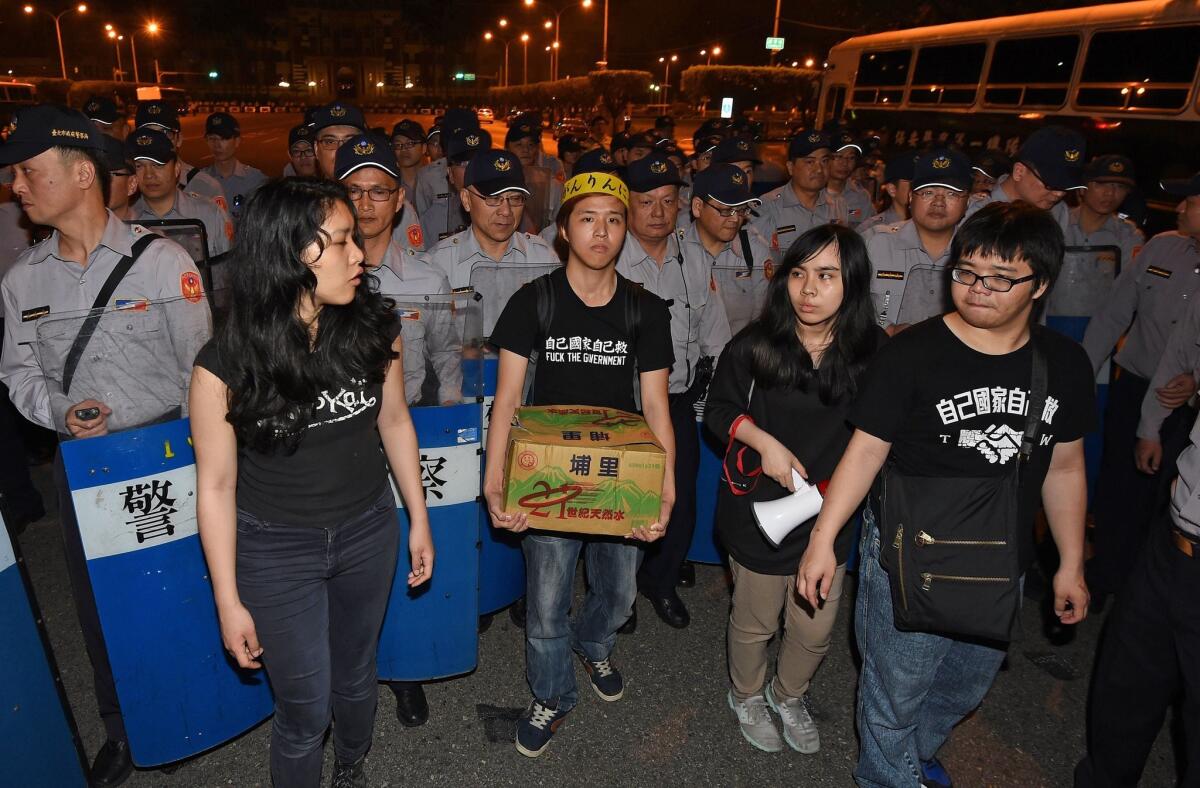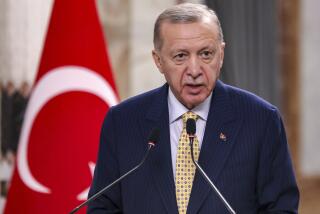Brouhaha over bank reflects shifting power dynamic between U.S., China

- Share via
Reporting from Beijing — For years, U.S. officials have chafed at what they contend is Chinese freeloading on the world stage. While America has spilled blood and spent a fortune on vexing challenges such as Islamic extremism and African epidemics, China, the muttering goes, hangs back or even swoops in on Washington’s coattails to capitalize economically.
“They are free riders and have been free riders for the last 30 years, and it’s worked well for them,” President Obama said of China in an interview last summer with the New York Times. “No one ever expects them to do anything.”
So when China, now the world’s second-largest economy behind the U.S., proposed in 2013 to establish a new bank to provide loans to fund infrastructure projects in developing Asian countries and invited other countries to participate, it might have sounded like just the kind of stepping-up Washington had in mind.
But the Asia Infrastructure Investment Bank would also be a challenger of sorts to U.S.-led institutions like the World Bank, the International Monetary Fund and the Asian Development Bank (which is led by the U.S. and Japan). American officials sought to dissuade allies from taking part in the AIIB.
Publicly, U.S. authorities expressed concerns that a China-led development bank might not adhere to sufficiently high standards of transparency or environmental requirements. But many observers suspected such stated misgivings masked more fundamental U.S. worries about China eroding America’s preeminence on a global scale.
When the deadline for applying to be a founding bank member passed this week, China had notched 46 applications – including from U.S. allies including Britain, Australia, France, Italy, Germany and South Korea. Japan was nearly alone in refusing to break ranks with Washington.
Beijing, not surprisingly, has been crowing about it. “The soaring participation has been seen as evidence of China’s growing international sway,” the state-run Xinhua News Agency said in a news report. “If there is one message to glean from the number of applicants, it is that the world has sensibly voted for a more inclusive, balanced and mutually beneficial international economic order.”
The Global Times, a nationalistic newspaper affiliated with the Chinese Communist Party, said in an editorial that the success in signing up so many partners “has pushed China toward becoming a ‘real major power.’” Founding the AIIB is a “big achievement for China,” it added, while taking oblique note of carping from unnamed quarters. “The greater the good deed is, the more trouble it will attract. The more a country does, the more it will be criticized.”
Appearing increasingly isolated, the Obama administration has come in for a drubbing for its handling of the affair. In a commentary for the Washington Post, Daniel W. Drezner, a professor of international politics at Tufts University and a fellow at the Brookings Institution think tank, pointedly characterized the situation with an expletive suggesting a complete blunder.
The perception of sour grapes only grew when anonymous White House sources were quoted elsewhere griping about London’s “constant accommodation” of China.
Fundamentally, I do see it as a mismanagement of American diplomacy,” said Steve Tsang, head of the School of Contemporary Chinese Studies at the University of Nottingham. “Yet at the same time, I don’t see it as huge victory for Chinese diplomacy.”
“If the U.S. had just acted like they didn’t care so much, it wouldn’t have been a big deal,” Tsang added. “The allies breaking rank with the U.S. is not so much about thinking that the U.S. is less important; it’s just that China is increasing in importance. … When dealing with a rising power like China, there’s no real alternative to engagement; non-engagement won’t get you very far.”
Seeking to calm the waters, U.S. Treasury Secretary Jacob Lew, who visited China early this week, said Tuesday in speech in San Francisco that America was “ready to welcome” the AIIB as long as it “complements” organizations like the IMF and the World Bank.
Xu Bin, a professor of economics and finance at the China Europe International Business School in Shanghai, said the bank is an attractive proposition for China for many reasons.
The country, he noted, now has extensive experience in infrastructure projects like building airports and railways, but its own economy is slowing and its industries have excess capacity. So assisting projects in other countries is helpful for Chinese companies going abroad.
At the same time, China has hefty foreign reserves that make establishing AIIB feasible, and its leaders want to internationalize the country’s currency, the renminbi, giving it more clout globally. And in areas like the South China Sea, where China’s oil exploration efforts and work to expand the land mass of contested islands have upset neighbors including Vietnam and the Philippines, the AIIB could be a means of smoothing relations.
In time, Xu predicted, the U.S. and Japan will join in. “I’m sure sooner or later the U.S. and Japan will participate, it’s just a question of how long. Only by participating can you influence it,” he said.
China’s open call for other countries to join the AIIB did pose some delicate political questions for authorities in Beijing. Longtime ally North Korea reportedly sought to join, the NK News website reported, but was rejected because the tightly controlled Communist state lacks a functional banking system.
Taiwan, meanwhile, apparently will have its application welcomed, even though Beijing does not acknowledge that the self-ruled island off its southeast coast is a separate country. China normally asks that other countries and international agencies reject any position or agreement that implies Taiwan has statehood.
Since taking office in 2008, Taiwan’s president, Ma Ying-jeou, has pushed for trade agreements with other governments and participation in regional bodies that offer tariff cuts or other advantages to its export sector. Otherwise, the government fears, Taiwan will lose out to exporter rivals such as Japan and South Korea.
But Ma’s opponents worry that too-close economic ties with China will let Beijing erode the island’s self-rule. Small protests involving several dozen demonstrators broke out in Taipei this week when Taiwan said it intended to apply for AIIB membership.
Xu, of CEIBS, said he believed Taiwan’s participation would help it integrate more deeply with other Asian economies. For China, Xu said, the AIIB is a vehicle through which President Xi Jinping and other leaders in Beijing may be able to foster better relations across a wide swath of Asia.
“This is a breakthrough point for Xi Jinping,” said Xu. “China is emerging as a superpower in Asia, and many countries are afraid. Through this [AIIB], China can demonstrate it’s helpful and valuable, and not a threat.”
But Lew, the U.S. Treasury secretary, said Washington was still waiting to see how China would use its leading role in the AIIB to shape the region.
“With China’s economic growth and emerging focus on driving international development,” he said in San Francisco, “there is considerable interest in how China will integrate into the framework for international economic relations sustained since World War II, how it will use its new influence, and what ideas and ideals it will promote.”
Special correspondent Ralph Jennings in Taipei contributed to this report.
Follow @JulieMakLAT for news from China
More to Read
Sign up for Essential California
The most important California stories and recommendations in your inbox every morning.
You may occasionally receive promotional content from the Los Angeles Times.










